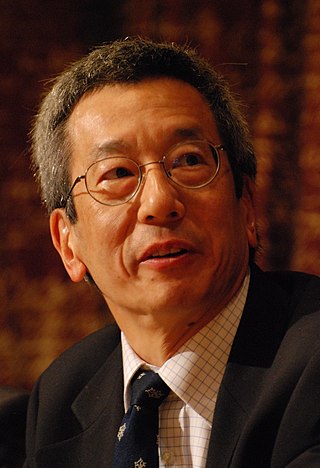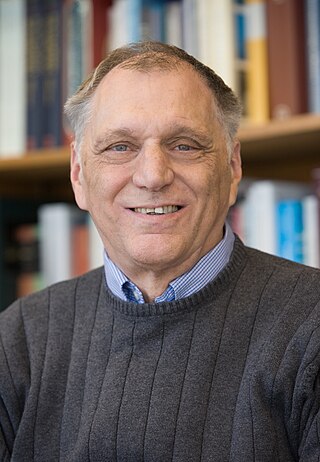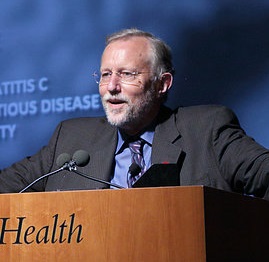Related Research Articles

George Emil Palade was a Romanian-American cell biologist. Described as "the most influential cell biologist ever", in 1974 he was awarded the Nobel Prize in Physiology and Medicine along with Albert Claude and Christian de Duve. The prize was granted for his innovations in electron microscopy and cell fractionation which together laid the foundations of modern molecular cell biology, the most notable discovery being the ribosomes of the endoplasmic reticulum – which he first described in 1955.

Randy Wayne Schekman is an American cell biologist at the University of California, Berkeley, former editor-in-chief of Proceedings of the National Academy of Sciences and former editor of Annual Review of Cell and Developmental Biology. In 2011, he was announced as the editor of eLife, a new high-profile open-access journal published by the Howard Hughes Medical Institute, the Max Planck Society and the Wellcome Trust launching in 2012. He was elected to the National Academy of Sciences in 1992. Schekman shared the 2013 Nobel Prize for Physiology or Medicine with James Rothman and Thomas C. Südhof for their ground-breaking work on cell membrane vesicle trafficking.

The University of California San Diego School of Medicine is the graduate medical school of the University of California, San Diego, a public land-grant research university in La Jolla, California. It was the third medical school in the University of California system, after those established at UCSF and UCLA, and is the only medical school in the San Diego metropolitan area. It is closely affiliated with the medical centers that are part of UC San Diego Health.
James D. Hollan is professor of cognitive science and adjunct professor of computer science at the University of California, San Diego. In collaboration with Professor Edwin Hutchins, he directs the Distributed Cognition and Human–Computer Interaction Laboratory at UCSD, and co-directs the Design Lab. Hollan has also spent time working at Xerox PARC and at Bellcore. He was elected to the CHI Academy in 2003 and received the ACM SIGCHI Lifetime Research Award in 2015.

Andrew Alm Benson was an American biologist and a professor of biology at the University of California, San Diego, until his retirement in 1989. He is known for his work in understanding the carbon cycle in plants.

Roger Yonchien Tsien was an American biochemist. He was a professor of chemistry and biochemistry at the University of California, San Diego and was awarded the Nobel Prize in Chemistry in 2008 for his discovery and development of the green fluorescent protein, in collaboration with organic chemist Osamu Shimomura and neurobiologist Martin Chalfie. Tsien was also a pioneer of calcium imaging.

Theodore Holmes Bullock is one of the founding fathers of neuroethology. During a career spanning nearly seven decades, this American academic was esteemed both as a pioneering and influential neuroscientist, examining the physiology and evolution of the nervous system across organizational levels, and as a champion of the comparative approach, studying species from nearly all major animal groups—coelenterates, annelids, arthropods, echinoderms, molluscs, and chordates.

Walter F. Heiligenberg was a German American scientist best known for his neuroethology work on one of the best neurologically understood behavioral patterns in a vertebrate, Eigenmannia. This weakly electric fish and the neural basis for its jamming avoidance response behavioral process was the main focus of his research, and is fully explored in his 1991 book, "Neural Nets in Electric Fish."
Ajit Varki is a physician-scientist who is distinguished professor of medicine and cellular and molecular medicine, founding co-director of the Glycobiology Research and Training Center at the University of California, San Diego (UCSD), and founding co-director of the UCSD/Salk Center for Academic Research and Training in Anthropogeny (CARTA). He is also executive editor of the textbook Essentials of Glycobiology and distinguished visiting professor at the Indian Institute of Technology in Madras and the National Center for Biological Sciences in Bangalore. He is a specialist advisor to the Human Gene Nomenclature Committee.

Larry Ryan Squire is a professor of psychiatry, neurosciences, and psychology at the University of California, San Diego, and a Senior Research Career Scientist at the Veterans Affairs Medical Center, San Diego. He is a leading investigator of the neurological bases of memory, which he studies using animal models and human patients with memory impairment.

Shu Chien, is a Chinese–American physiologist and bioengineer. His work on the fluid dynamics of blood flow has had a major impact on the diagnosis and treatment of cardiovascular diseases such as atherosclerosis. More recently, Chien's research has focused on the mechanical forces, such as pressure and flow, that regulate the behaviors of the cells in blood vessels. Chien is currently President of the Biomedical Engineering Society.

James Richard Arnold was the Harold C. Urey Professor of Chemistry (emeritus), and a noted pioneer in the field of planetary and space chemistry at the University of California at San Diego (UCSD), where an endowed lectureship has been established in his name.
Merrill Brian Maple is an American physicist. He is a distinguished professor of physics and holds the Bernd T. Matthias Chair in the physics department at the University of California, San Diego, and conducts research at the university's Center for Advanced Nanoscience. He has also served as the director of UCSD's Institute for Pure and Applied Physical Sciences (1995-2009) and its Center for Interface and Materials Science (1990-2010). His primary research interest is condensed matter physics, involving phenomena like magnetism and superconductivity. He has authored or co-authored more than 900 scientific publications and five patents in correlated electron physics, high pressure physics, nano physics, and surface science.

Alan Frederick Hofmann was a gastrointestinal physiologist, biochemist and clinician who was notable for his extensive basic, translational and clinical research on bile acids and lipid digestion. From 1977, he was a member of the Division of Gastroenterology at University of California, San Diego. He influenced and mentored a large number of researchers with his ideas, knowledge and support.

Don W. Cleveland is an American cancer biologist and neurobiologist.

Charles Moen Rice is an American virologist and Nobel Prize laureate whose main area of research is the hepatitis C virus. He is a professor of virology at the Rockefeller University in New York City and an adjunct professor at Cornell University and Washington University School of Medicine. At the time of the award he was a faculty at Rockefeller.
Kimberly A. Prather is an American atmospheric chemist. She is a distinguished chair in atmospheric chemistry and a distinguished professor at the Scripps Institution of Oceanography and department of chemistry and biochemistry at UC San Diego. Her work focuses on how humans are influencing the atmosphere and climate. In 2019, she was elected a member of the National Academy of Engineering for technologies that transformed understanding of aerosols and their impacts on air quality, climate, and human health. In 2020, she was elected as a member of the National Academy of Sciences. She is also an elected Fellow of the American Philosophical Society, American Geophysical Union, the American Association for the Advancement of Science, American Philosophical Society, and the American Academy of Arts and Sciences.
Thomas Michael O'Neil is an American physicist who specializes in plasma physics.
Paul Anthony Insel is an American physician and pharmacologist. He has been the chief editor of four academic journals and is an elected fellow of the American Association for the Advancement of Science, American Society for Pharmacology and Experimental Therapeutics, and American Physiological Society. His research is primarily focused on G proteins.
References
- ↑ James T. Enright | Library Digital Collections
- ↑ J T Enright's research works
- ↑ "UCSD faculty members honored". Times-Advocate. Escondido, CA. January 26, 1981. p. B-2. Retrieved November 12, 2020.
- ↑ Johnson, Dean C., ed. (March 23, 1981). "German Foundation Honors Two Scientists for Teaching, Research Accomplishments". University Bulletin: A Publication for Faculty and Staff of the University of California. University of California. 29 (24): 3.